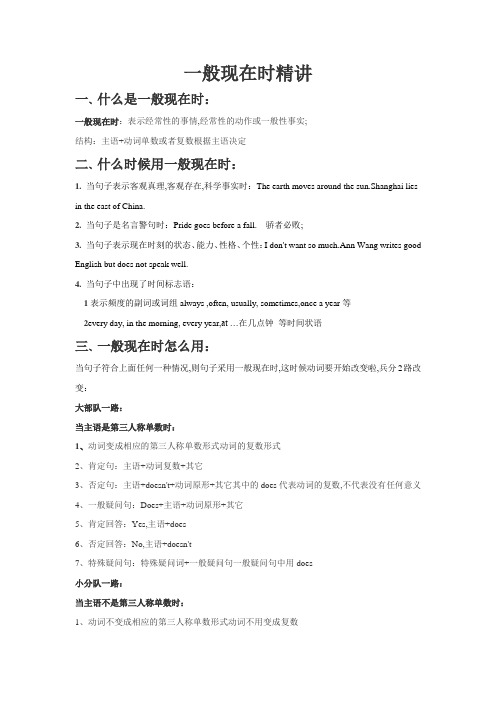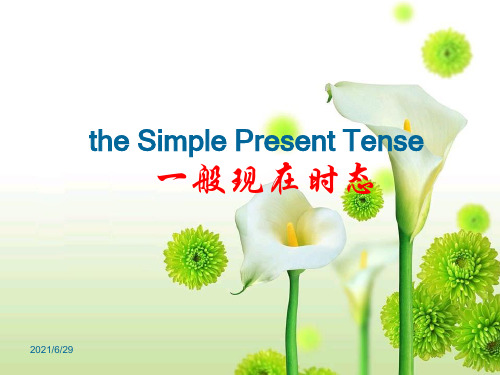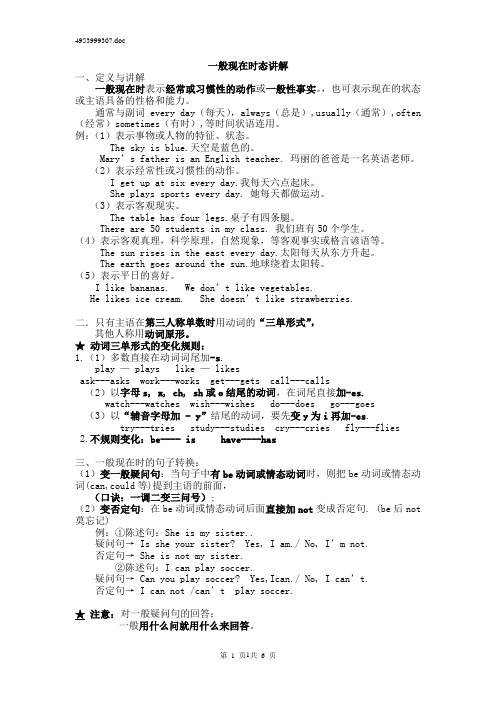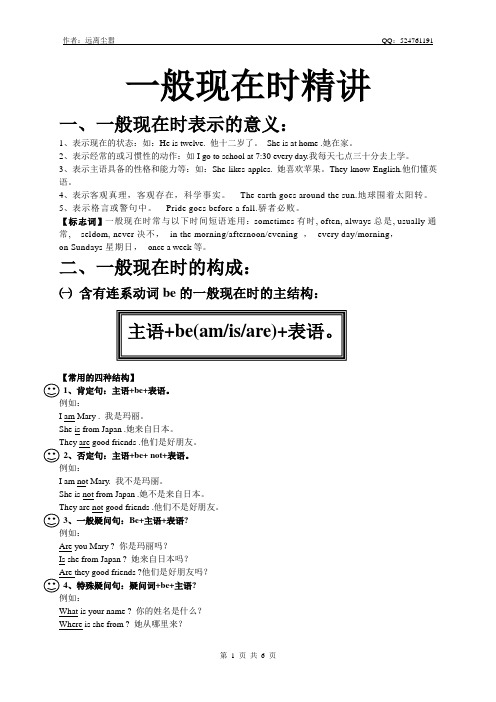(完整版)一般现在时(精讲)
一般现在时语法三单精讲

一般现在时精讲一、什么是一般现在时:一般现在时:表示经常性的事情,经常性的动作或一般性事实;结构:主语+动词单数或者复数根据主语决定二、什么时候用一般现在时:1. 当句子表示客观真理,客观存在,科学事实时:The earth moves around the sun.Shanghai lies in the east of China.2. 当句子是名言警句时:Pride goes before a fall.骄者必败;3. 当句子表示现在时刻的状态、能力、性格、个性:I don't want so much.Ann Wang writes good English but does not speak well.4. 当句子中出现了时间标志语:1表示频度的副词或词组always ,often, usually, sometimes,once a year等2every day, in the morning, every year,at …在几点钟等时间状语三、一般现在时怎么用:当句子符合上面任何一种情况,则句子采用一般现在时,这时候动词要开始改变啦,兵分2路改变:大部队一路:当主语是第三人称单数时:1、动词变成相应的第三人称单数形式动词的复数形式2、肯定句:主语+动词复数+其它3、否定句:主语+doesn't+动词原形+其它其中的does代表动词的复数,不代表没有任何意义4、一般疑问句:Does+主语+动词原形+其它5、肯定回答:Yes,主语+does6、否定回答:No,主语+doesn't7、特殊疑问句:特殊疑问词+一般疑问句一般疑问句中用does小分队一路:当主语不是第三人称单数时:1、动词不变成相应的第三人称单数形式动词不用变成复数2、肯定句:主语+动词原形+其它3、否定句:主语+don't+动词原形+其它其中的do代表动词的单数,不代表没有任何意义4、一般疑问句:Do+主语+动词原形+其它5、肯定回答:Yes,主语+do6、否定回答:No,主语+don't7、特殊疑问句:特殊疑问词+一般疑问句一般疑问句中用do总结起来就是这样的四、那么,动词如何变成复数呢:三单变化:1直接在动词词尾加-s.ask---asks work---works get---gets stay---stays2以字母s, x, ch, sh或o结尾的动词,在词尾直接加-es.watch---watches wish---wishes fix---fixes do---doesgo---goes pass---passes3以“辅音字母加- y”结尾的动词,要先变y为i再加-es.try---tries study---studies cry---cries fly---flies一、考点/易错点1动词变形有误1 He __ football very well.2 Danny __ to school at 7:10.答案:1 plays 2 goes plaies, gos解析:1以加y结尾的动词变单三人称形式才能把y换成i再加es;2与名词变复数不同,变单三人称形式以o结尾的词要加es.考点/易错点2对主语判断有误例:This book __mine答案: is解析: 书是属于“它it”的范围,是无生命的它,所以也是三单;二、例题精析We often___________play in the playground.A. playB. playsC. plaiesA主语是”we”,“often”是频率副词,句子用一般现在时三、实践运用基础1. The picture _______ nice.A. looksB. is lookedC. lookD. is looking答案:A解析:主语是第三人称单数,谓语动词用三单形式2. I ________TV once a week.A. watchesB. watchsC. watch答案:C解析:once a week一周一次,表示频率,动词用一般现在时;主语是第一人称,动词用原形; 巩固1. John always ______ others.A. helpB. helpingC. helpsD. to help答案:C解析:主语是第三人称单数,谓语动词用三单形式2. The teacher told us that the sun ____in the east.B. roseC. raises答案:A解析:太阳从东方升起,这是客观事实,用一般现在时,动词要用单三式拔高1. The students will go to the Summer Palace if it _____ tomorrow.A. don't rainB. doesn't rainC. won't rain答案:B;2. You should visit this part of the country when ___.A. spring will comB. spring comesC. It has been springD. It will be spring答案:B解析:when引导的时间,从句一般时态,主句用态或;所以选B专项练习:写出下列动词的相应形式:1. 第三人称单数:wash_________ match _______guess______ study______finish_________ go________ snow______ carry_________2.写出下列动词的过去式:stop______ see________ drive ________let_______carry______ keep_____ join______ find_______ think________ teach______catch______3. 写出下列动词的现在分词形式:stay_______ begin______ forget_______forget______ lie________ die _______ run_______ prefer______ give________ring_______ dance______ hope_______II. 用所给动词的适当形式填空:√1.I ________write to you as soon as I _______get to London.√2. He doesn’t feel well and ____________not eat any food this morning.√3. He ______ not _______see me come in, for he ___________read something with great interest.√4. I _________let you have the book as soon as I _________finish it.√5. While we ________wait for our teacher, a little boy ________run up to us.6. Don’t make a noise. Grandpa __________sleep.’s seven now, Tom’s family__________watch TV.√8. It ________take me two hours to finish my homework last night.√9. What ______ your mother _______do at eight yesterday evening She _______wash clothes.10. _______ it ______ rain when school was over yesterday11. What _______do _______ tomorrow We ________ play football.12. There ________ be a football match on TV this evening.13. They said they ________ visit the Great Wall the next summer holiday.√14. Who _______ dance the best in your class15. Will you come if he _____________ not come√16. The teacher told us the earth __________ move round the sun.17. They _______ have a party in the garden if it ________ not rain tomorrow.18 She ________ buy a sweater yesterday.19. I don’t know if ______ go to Shanghai tomorrow. If he _____ go, I ______ ask him _______ take some books to my daughter, because she _______ study there.III单项选择:students will go to the Summer Palace if it _____ tomorrow.’t rain B. doesn’t rain C. won’t rain2. There _____ an English film next week.A. will haveB. is going to haveC. is going to beD. was going to be3. The picture _______ nice.A. looksB. is lookedC. lookD. is looking4. She ______ down and soon fell asleep.A. liveB. lainC. laidD. lay5. They _____ the office at nine yesterday morning.A. reached toB. arrivedC. wentD. get to6. We shall go to Shanghai on business before you _____ back next week.A. wil comeB. cameC. would comeD. come7. Don’t smoke until the plane ______ off.A. takesB. tookC. was takenD. is take8. I saw her ____ the room this morning.A. to enterB. enteredC. enterD. entersteacher asked us ______ to school on time. A. to come B. coming C. come D. comes 10. John is always ______ others. A. help B. helping C. helps D. to help 11. He told us ______ at eight. A. working B. to work C. work D. worked 12. You’d better ______ at home and______ your homework. A. to stay, do B. stay, do C. to stay, to do D. stay, to do 13. He sat down ______ a rest. A. having B. have C. to have D. had 14. Uncle Wang knows _______ a washing machine. A. how to make B. to make C. how making D. what to make 15. Jim decided _______ Polly to Ling Feng when he was back to England. A. to leave B. left C. leaving D. leave。
(完整版)一般现在时课件

一般疑问句: Be+主语+表语?
Are your parents doctors? Yes, they are./No, they aren’t. Is Mr Long 28 years old? Yes, he is./No, he isn’t.
2021:表示行为动作的词语
3. 经常、习惯、反复做的事情 We have lunch at 12:30. We go to school on Monday.
2021/6/29
be 动词的一般现在时:
be: am, is, are
用be动词的适当形式填空: I ‗a‗m‗‗ he‗‗is‗‗ she ‗i‗s‗‗
iti‗s‗‗‗ Tomis‗‗‗‗
否定句:
☺主语(I/We/You/They)+do+ not+动词原形+其他 I don’t watch TV on Sunday. ☺主语(He/She/It)+does +not+动词原形+其他 He doesn’t watch TV at home on Sunday.
2021/6/29
Practice:
5. 特殊情况 have– has
把下面的行为动词变为第三人称单数形式:
go―goes
carry―carries ride―rides
open―opens
have ― has
teach―teaches brush― brushes dey―deys
play―plays
finish―finishes
2021/6/29
1.一般情况直接加s e.g. reads, plays, works, makes
小学英语语法一般现在时详细讲解

主语(I/We/You/They)+ do+not+动词原形+其他
如:I don’t stay at home on Saturdays. They don’t have sports every day.
主语(He/She/It)+ does+not+动词原形+其他
特殊疑问句: 疑问词+一般疑问句? 直接回答,而不用yes 或no.
5.一般现在时的句型变换 1) I usually play football on Friday. 改为一般疑问句: Do you usually play football on Friday? 对划线部分提问: What do you usually do on Friday? 2) My father go to work by bike everyday. 对划线部分提问: How does your father go to work everyday?
3. 表示永恒不变的真理;
The moon goes round the earth.
一. be动词的一般现在时
be动词: 主语 + be +其它
如:I am a boy. 我是一个男孩。问句:
4) 特殊疑问句: 疑问词+ do/does+主语+动词原形+其他? 如: What do you want? What does she want? What time do you have lunch? What time does she have lunch? What do you do? What does she do? How do you spell it? How does he spell it?
中学英语16种时态完美精讲

中学英语16种时态完美精讲(每一种用法配一例句)1. 一般现在时simple present tense用法:A) 表示现在发生的动作、情况、状态和特征【例】My father is not home yet. 我父亲还没回家.She is a student. 她是一个学生。
B) 经常性、习惯性动作,常与表示频度的副词连用,如always,often,seldom等【例】He always eats an apple in the morning. 他常常在早上吃一个苹果。
C) 表示客观事实和普遍真理The earth moves around the sun. 地球绕太阳转动。
D) 表示按计划安排好的,或将要发生的动作,可用一般现在表将来,但仅限于start, leave, go, arrive, begin等单词【例】The train leaves at 3:00 p.m.. 火车三点发车。
The show begins in half an hour. 半小时后演出开始。
E) 在时间和条件状语从句中,主句是将来时,从句通常用一般现在(有时也用现在完成时)表示将来事情【例】I will go to bed when he comes back. 等他回来了我就去睡觉。
If you don't stop the yelling, I will leave right now. 如果你还继续大吼大叫的话,我现在就走。
2. 现在进行时present progressive tense用法:A) 表示说话时正在进行的动作【例】They are having lunch. 他们在吃饭。
B) 表示现阶段正在进行的动作【例】We are looking for a new house. 我们现在在找新房子。
3. 现在完成时present perfect tense用法:A) 表示动作到现在为止已经完成或刚刚完成【例】I have just finished my homework. 我刚刚才写完作业。
一般现在时ppt课件完整版

不可数名词作主语时,谓语动词用单数 形式。
可数名词单数作主语时,谓语动词也用 单数形式。
例如:Water is essential for life.(水 对生命至关重要。)/ A book is on the table.(一本书在桌子上。)
例外情况总结
当主语为并列主语时,谓语动词的数要与靠近它的主语保持一致。
练习3答案
reads。解析:主语 She 是第三人称单数 ,且时间状语为 on weekends,表示经 常性动作,所以谓语动词要用单数形式 reads。
THANKS
时间状语分类及举例
表示经常性或习惯性的动作
always, usually, often, sometimes
表示现在的状态或特征
now, at present, these days
表示普遍真理或客观事实
in general, as a rule
频率副词分类及举例
01
高频副词
always, constantly, continually
注意区分完全否定和部分否定。完全 否定表示全部否定,而部分否定表示 部分否定。例如,“None of the students passed the exam.”(没 有一个学生通过了考试)是完全否定 ;“Not all of the students passed the exam.”(并非所有学生都通过 了考试)是部分否定。
does he work?等。
动词短语和情态动词的变化规则
03
动词短语中的动词和情态动词后接动词原形,如I can swim,
they often go out等。
02 肯定句结构与用法
主语+动词原形+其他成分
初一一般现在时态精讲讲解

一般现在时态讲解一、定义与讲解一般现在时表示经常或习惯性的动作或一般性事实。
,也可表示现在的状态或主语具备的性格和能力。
通常与副词every day(每天),always(总是),usually(通常),often (经常)sometimes(有时),等时间状语连用。
例:(1)表示事物或人物的特征、状态。
The sky is blue.天空是蓝色的。
Mary’s father is an English teacher. 玛丽的爸爸是一名英语老师。
(2)表示经常性或习惯性的动作。
I get up at six every day.我每天六点起床。
She plays sports every day. 她每天都做运动。
(3)表示客观现实。
The table has four legs.桌子有四条腿。
There are 50 students in my class. 我们班有50个学生。
(4)表示客观真理,科学原理,自然现象,等客观事实或格言谚语等。
The sun rises in the east every day.太阳每天从东方升起。
The earth goes around the sun.地球绕着太阳转。
(5)表示平日的喜好。
I like bananas. We don’t like vegetables.He likes ice cream. She doesn’t like strawberries.二.只有主语在第三人称单数时用动词的“三单形式”,其他人称用动词原形。
★动词三单形式的变化规则:1.(1)多数直接在动词词尾加-s.play — plays like — likesask---asks work---works get---gets call---calls(2)以字母s, x, ch, sh或o结尾的动词,在词尾直接加-es.watch---watches wish---wishes do---does go---goes (3)以“辅音字母加 - y”结尾的动词,要先变y为i再加-es.try---tries study---studies cry---cries fly---flies2.不规则变化:be---- is have----has三、一般现在时的句子转换:(1)变一般疑问句:当句子中有be动词或情态动词时,则把be动词或情态动词(can,could等)提到主语的前面,(口诀:一调二变三问号);(2)变否定句:在be动词或情态动词后面直接加not变成否定句. (be后not 莫忘记)例:①陈述句:She is my sister..疑问句→ Is she your sister? Yes, I am./ No, I’m not.否定句→ She is not my sister.②陈述句:I can play soccer.疑问句→ Can you play soccer? Yes,Ican./ No, I can’t.否定句→ I can not /can’t play soccer.★注意:对一般疑问句的回答:一般用什么问就用什么来回答。
一般现在时精讲

一般现在时精讲一、一般现在时表示的意义:1、表示现在的状态:如:He is twelve. 他十二岁了。
She is at home .她在家。
2、表示经常的或习惯性的动作:如I go to school at 7:30 every day.我每天七点三十分去上学。
3、表示主语具备的性格和能力等:如:She likes apples. 她喜欢苹果。
They know English.他们懂英语。
4、表示客观真理,客观存在,科学事实。
The earth goes around the sun.地球围着太阳转。
5、表示格言或警句中。
Pride goes before a fall.骄者必败。
【标志词】一般现在时常与以下时间短语连用:sometimes 有时, often, always 总是, usually 通常, seldom, never 决不, in the morning/afternoon/evening , every day/morning ,on Sundays 星期日, once a week 等。
二、一般现在时的构成:㈠ 含有连系动词be 的一般现在时的主结构:【常用的四种结构】1、肯定句:主语+be+表语。
例如: I am Mary . 我是玛丽。
She is from Japan .她来自日本。
They are good friends .他们是好朋友。
2、否定句:主语+be+ not+表语。
例如:I am not Mary. 我不是玛丽。
She is not from Japan .她不是来自日本。
They are not good friends .他们不是好朋友。
3、一般疑问句:Be+主语+表语?例如:Are you Mary ? 你是玛丽吗?Is she from Japan ? 她来自日本吗?他们是好朋友吗?+be+主语?例如:What is your name ? 你的姓名是什么?Where is she from ? 她从哪里来? 主语+be(am/is/are)+表语。
一般现在时讲解

一般现在时讲解什么是一般现在时?一般现在时是英语中最基本的时态之一,表示现在经常发生或普遍存在的动作、习惯、真理或状态。
在句子中,一般现在时使用主语的原形动词加上第三人称单数或复数的词形变化。
例如:she plays tennis every weekend(她每个周末打网球)。
一般现在时的使用场景:1. 经常性动作一般现在时经常用于表示一种经常或重复发生的动作。
例如:•I walk my dog every morning.(我每天早上遛狗。
)•They eat dinner at 6 p.m. every day.(他们每天晚上六点吃晚饭。
)2. 习惯或规律一般现在时还可以用于表示一种习惯或规律。
例如:•He always drinks coffee in the morning.(他每天早上都喝咖啡。
)•We never go to bed before 11 p.m.(我们从不在晚上11点之前睡觉。
)3. 真理或普遍规律一般现在时也可以用于陈述普遍真理或规律。
例如:•The sun rises in the east.(太阳从东方升起。
)•Water boils at 100 degrees Celsius.(水在100摄氏度沸腾。
)一般现在时的用法:1. 肯定句在肯定句中,一般现在时使用主语的原形动词。
例如:•He eats breakfast every morning.(他每天早上吃早饭。
)•They go to school by bus.(他们乘公交车上学。
)2. 否定句在否定句中,一般现在时使用do not或does not连接主语与动词的原形形式。
例如:•She does not like coffee.(她不喜欢咖啡。
)•They do not play football on Sundays.(他们星期天不踢足球。
)3. 疑问句在疑问句中,一般现在时使用do或does加上主语和动词的原形形式。
